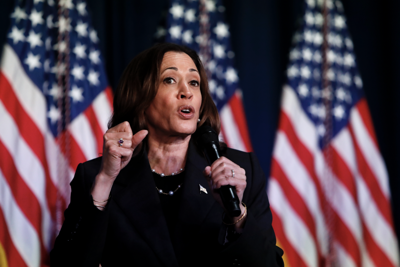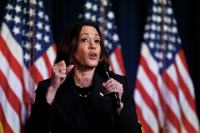
Image Credit: Getty Images
Over the weekend, President Joe Biden announced that he would not run for re-election and instead endorsed his Vice President, Kamala Harris. Biden's endorsement of Harris marks a pivotal moment for the Democratic Party, signaling a significant internal shift. The decision positions Harris as a central figure in Democratic strategy and potentially paves the way for her to secure a victory in the November election.
During her time in the Senate from 2017 to 2021, Harris supported comprehensive immigration reform, including pathways to citizenship for undocumented immigrants. Harris has been a vocal critic of the Trump administration's immigration policies, including the separation of families at the border and the so-called Muslim ban. She has supported measures to protect DACA recipients and expand legal immigration pathways.
"She is a champion for the immigrant community giving voice to our pressing need to update the nation’s outdated immigration laws," said Angelica Salas, CHIRLA Action Fund president.
As the Vice President under Biden’s administration, Harris was tasked with leading diplomatic efforts with Central American countries to address the root causes of migration. Confronted by a rise in migrant crossings at the U.S. southern border, Harris was assigned to spearhead the administration's diplomatic efforts to tackle the fundamental reasons behind migration from Guatemala, Honduras and El Salvador.
Throughout 2021 and 2022, Harris engaged in high-level discussions with leaders from Mexico, Guatemala, El Salvador and Honduras, emphasizing the importance of regional cooperation to create safer and more stable conditions within these countries. She worked closely with government agencies, non-profit organizations and international partners to develop strategies aimed at managing the flow of migrants and ensuring humane treatment at the border. This involved efforts to improve the processing of asylum claims, enhance facilities for migrant care and streamline immigration policies to better align with humanitarian values.
Vice President Harris traveled to Guatemala and Mexico to discuss solutions to the migration crisis affecting the region. Central America, including countries like Guatemala, Honduras and El Salvador, has faced significant challenges such as poverty, violence and corruption. These issues have driven many people to seek better opportunities and safety in the United States, often undertaking dangerous journeys.
During her speech in Guatemala City, Vice President Harris emphasized that the United States was committed to addressing the root causes of migration and improving conditions in the region to discourage people from making the perilous journey north. Her message included urging potential migrants not to come to the United States, emphasizing the dangers of the journey and the possibility of being turned away at the border.
“I want to be clear to folks in this region who are thinking about making that dangerous trek to the United States-Mexico border: Do not come. Do not come,” she said. “And I believe if you come to our border, you will be turned back.”
The now-infamous "do not come" speech received backlash from migrant advocates who criticized it for lacking empathy and failing to acknowledge the dire circumstances that often compel people to migrate, such as violence, poverty and persecution. Many criticized Harris for what they saw as a harsh or unsympathetic tone towards migrants, arguing that the focus should be on addressing asylum claims and human rights abuses rather than deterrence.
Many migrants arriving at the U.S. border are asylum seekers fleeing dangerous situations in their home countries. Advocates argued that the speech did not reflect a commitment to upholding international asylum laws and providing a fair process for those seeking refuge.
Similarly, Harris has also faced criticism from some Latino voters about the pace of immigration reform efforts under the Biden-Harris administration and the handling of border security issues.
As the new Democratic frontrunner, Harris now has an opportunity to set herself apart from President Biden by taking a more proactive and visible role in shaping immigration policy. While Biden's administration has faced criticism for its handling of issues such as border security and deportation policies, Harris can seize the initiative by engaging directly with affected communities.
The Harris campaign has the potential to engage the Latino electorate by supporting equitable and streamlined asylum procedures, improving conditions in detention centers and advocating for pathways to citizenship for undocumented immigrants. By prioritizing these initiatives, Harris can showcase leadership that resonates with both humanitarian principles and practical policy goals.











(0) comments
Welcome to the discussion.
Log In
Keep it Clean. Please avoid obscene, vulgar, lewd, racist or sexually-oriented language.
PLEASE TURN OFF YOUR CAPS LOCK.
Don't Threaten. Threats of harming another person will not be tolerated.
Be Truthful. Don't knowingly lie about anyone or anything.
Be Nice. No racism, sexism or any sort of -ism that is degrading to another person.
Be Proactive. Use the 'Report' link on each comment to let us know of abusive posts.
Share with Us. We'd love to hear eyewitness accounts, the history behind an article.